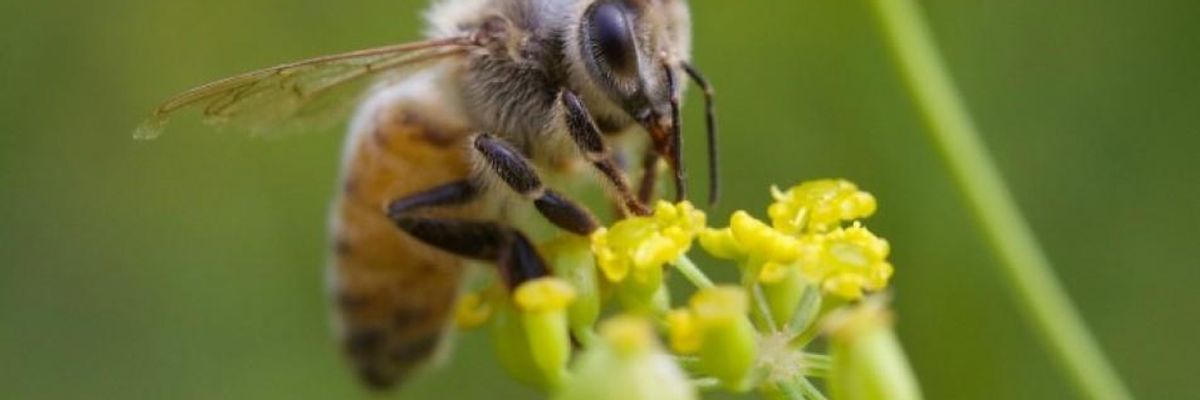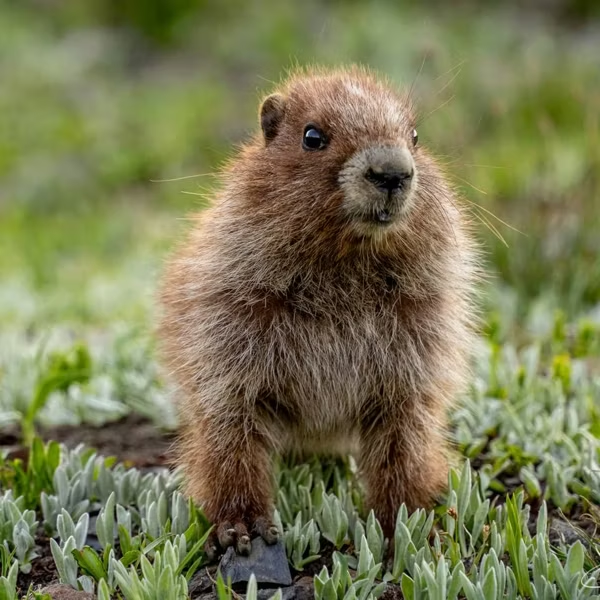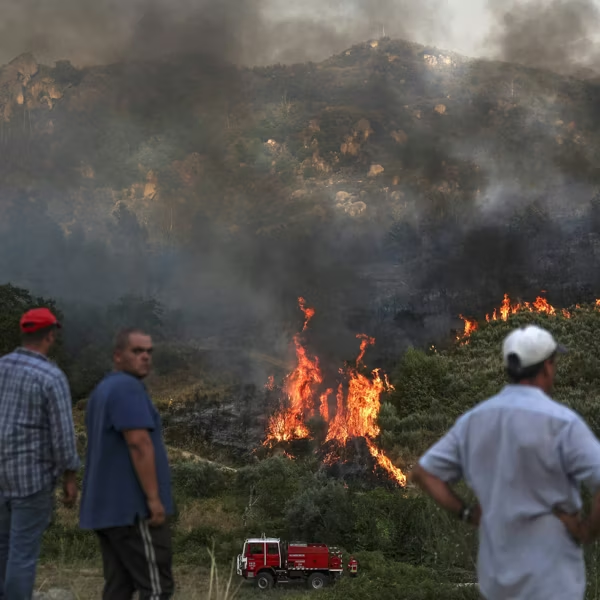
"Let us together as diverse species and diverse cultures and through poison free organic food and farming, rejuvenate the biodiversity of our pollinators and restore their sacredness," writes Dr. Vandana Shive on #WorldBeeDay. (Photo: Keith McDuffee/flickr/cc)
Poisons Mean Extinction: For Bees and Humanity
Protecting bees is an ecological duty, pushing them to extinction is an ecological crime. The threat to bees is a threat to humanity.
"If the bee disappeared off the face of the earth, man would only have four years left to live." -- Maurice Maeterlinck, The Life of the Bee
In the last 50 years agrotoxins have spread and are pushing bees to extinction.
The choices before humanity are clear, a Poison Free Future to save bees, farmers, our food and humanity. Or continue to use poisons, threatening our common future by walking blindly to extinction through the arrogance that we can substitute bees with artificial intelligence and robots.
"Robotic bees could pollinate plants in case of insect apocalypse," ran a recent Guardian headline reporting how Dutch scientists, "believe they will be able to create swarms of bee-like drones to pollinate plants when the real-life insects have died away."
"We see a crisis in 15 years where we don't have enough insects in the world to actually do pollination and most of our vitamins and fruits are gone," said Eylam Ran, CEO of Edete Precision Technologies for Agriculture. His company says its artificial pollinator can augment the labours of--and eventually replace--bees. Its system mirrors the work of the honey bee, beginning with a mechanical harvest of pollen from flowers and ending with a targeted distribution using LIDAR sensors, the same technology used in some self-driving cars."
There is no substitute for the amazing biodiversity and gifts of bees.
Every culture, every faith has seen the bees as teachers--of giving, of creating abundance, of creating the future of plants through pollination, and contributing to our food security and welfare. The next generation of seed is transformed into the next generation of seed only through the gift of the pollinator.
Navdanya's research has shown that more than 30% of the food we eat is produced by bees and pollinators.
Nature's economy is the gift economy. In every tradition the bee has been exemplified as a teacher in giving.
Buddhist texts note that from a multitude of living things, bees and other pollinating animals take what they need to survive without harming the beauty and vitality of their source of sustenance. For humans, to act in the manner of bees is an enactment of compassionate and conscious living.
St. John Chrysostom of the Catholic Church wrote, "The bee is more honored than other animals, not because she labors, but because she labors for others." (12th Homily)
In the Islamic tradition, the Quran's 16th chapter is titled 'The Bee.' This chapter is known to be the revelation of God.
In the Hindu tradition, there is a wonderful quote in the scripture Srimad Mahabhagavatam which reads, "Like a honey bee gathering honey from all type of flowers the wise men search everywhere for truth and see only good in all religions."
Let us together as diverse species and diverse cultures and through poison free organic food and farming, rejuvenate the biodiversity of our pollinators and restore their sacredness. We have the creative power to stop the sixth mass extinction and climate catastrophe without the need for these false technocratic solutions.
An Urgent Message From Our Co-Founder
Dear Common Dreams reader, The U.S. is on a fast track to authoritarianism like nothing I've ever seen. Meanwhile, corporate news outlets are utterly capitulating to Trump, twisting their coverage to avoid drawing his ire while lining up to stuff cash in his pockets. That's why I believe that Common Dreams is doing the best and most consequential reporting that we've ever done. Our small but mighty team is a progressive reporting powerhouse, covering the news every day that the corporate media never will. Our mission has always been simple: To inform. To inspire. And to ignite change for the common good. Now here's the key piece that I want all our readers to understand: None of this would be possible without your financial support. That's not just some fundraising cliche. It's the absolute and literal truth. We don't accept corporate advertising and never will. We don't have a paywall because we don't think people should be blocked from critical news based on their ability to pay. Everything we do is funded by the donations of readers like you. Will you donate now to help power the nonprofit, independent reporting of Common Dreams? Thank you for being a vital member of our community. Together, we can keep independent journalism alive when it’s needed most. - Craig Brown, Co-founder |
"If the bee disappeared off the face of the earth, man would only have four years left to live." -- Maurice Maeterlinck, The Life of the Bee
In the last 50 years agrotoxins have spread and are pushing bees to extinction.
The choices before humanity are clear, a Poison Free Future to save bees, farmers, our food and humanity. Or continue to use poisons, threatening our common future by walking blindly to extinction through the arrogance that we can substitute bees with artificial intelligence and robots.
"Robotic bees could pollinate plants in case of insect apocalypse," ran a recent Guardian headline reporting how Dutch scientists, "believe they will be able to create swarms of bee-like drones to pollinate plants when the real-life insects have died away."
"We see a crisis in 15 years where we don't have enough insects in the world to actually do pollination and most of our vitamins and fruits are gone," said Eylam Ran, CEO of Edete Precision Technologies for Agriculture. His company says its artificial pollinator can augment the labours of--and eventually replace--bees. Its system mirrors the work of the honey bee, beginning with a mechanical harvest of pollen from flowers and ending with a targeted distribution using LIDAR sensors, the same technology used in some self-driving cars."
There is no substitute for the amazing biodiversity and gifts of bees.
Every culture, every faith has seen the bees as teachers--of giving, of creating abundance, of creating the future of plants through pollination, and contributing to our food security and welfare. The next generation of seed is transformed into the next generation of seed only through the gift of the pollinator.
Navdanya's research has shown that more than 30% of the food we eat is produced by bees and pollinators.
Nature's economy is the gift economy. In every tradition the bee has been exemplified as a teacher in giving.
Buddhist texts note that from a multitude of living things, bees and other pollinating animals take what they need to survive without harming the beauty and vitality of their source of sustenance. For humans, to act in the manner of bees is an enactment of compassionate and conscious living.
St. John Chrysostom of the Catholic Church wrote, "The bee is more honored than other animals, not because she labors, but because she labors for others." (12th Homily)
In the Islamic tradition, the Quran's 16th chapter is titled 'The Bee.' This chapter is known to be the revelation of God.
In the Hindu tradition, there is a wonderful quote in the scripture Srimad Mahabhagavatam which reads, "Like a honey bee gathering honey from all type of flowers the wise men search everywhere for truth and see only good in all religions."
Let us together as diverse species and diverse cultures and through poison free organic food and farming, rejuvenate the biodiversity of our pollinators and restore their sacredness. We have the creative power to stop the sixth mass extinction and climate catastrophe without the need for these false technocratic solutions.
"If the bee disappeared off the face of the earth, man would only have four years left to live." -- Maurice Maeterlinck, The Life of the Bee
In the last 50 years agrotoxins have spread and are pushing bees to extinction.
The choices before humanity are clear, a Poison Free Future to save bees, farmers, our food and humanity. Or continue to use poisons, threatening our common future by walking blindly to extinction through the arrogance that we can substitute bees with artificial intelligence and robots.
"Robotic bees could pollinate plants in case of insect apocalypse," ran a recent Guardian headline reporting how Dutch scientists, "believe they will be able to create swarms of bee-like drones to pollinate plants when the real-life insects have died away."
"We see a crisis in 15 years where we don't have enough insects in the world to actually do pollination and most of our vitamins and fruits are gone," said Eylam Ran, CEO of Edete Precision Technologies for Agriculture. His company says its artificial pollinator can augment the labours of--and eventually replace--bees. Its system mirrors the work of the honey bee, beginning with a mechanical harvest of pollen from flowers and ending with a targeted distribution using LIDAR sensors, the same technology used in some self-driving cars."
There is no substitute for the amazing biodiversity and gifts of bees.
Every culture, every faith has seen the bees as teachers--of giving, of creating abundance, of creating the future of plants through pollination, and contributing to our food security and welfare. The next generation of seed is transformed into the next generation of seed only through the gift of the pollinator.
Navdanya's research has shown that more than 30% of the food we eat is produced by bees and pollinators.
Nature's economy is the gift economy. In every tradition the bee has been exemplified as a teacher in giving.
Buddhist texts note that from a multitude of living things, bees and other pollinating animals take what they need to survive without harming the beauty and vitality of their source of sustenance. For humans, to act in the manner of bees is an enactment of compassionate and conscious living.
St. John Chrysostom of the Catholic Church wrote, "The bee is more honored than other animals, not because she labors, but because she labors for others." (12th Homily)
In the Islamic tradition, the Quran's 16th chapter is titled 'The Bee.' This chapter is known to be the revelation of God.
In the Hindu tradition, there is a wonderful quote in the scripture Srimad Mahabhagavatam which reads, "Like a honey bee gathering honey from all type of flowers the wise men search everywhere for truth and see only good in all religions."
Let us together as diverse species and diverse cultures and through poison free organic food and farming, rejuvenate the biodiversity of our pollinators and restore their sacredness. We have the creative power to stop the sixth mass extinction and climate catastrophe without the need for these false technocratic solutions.

